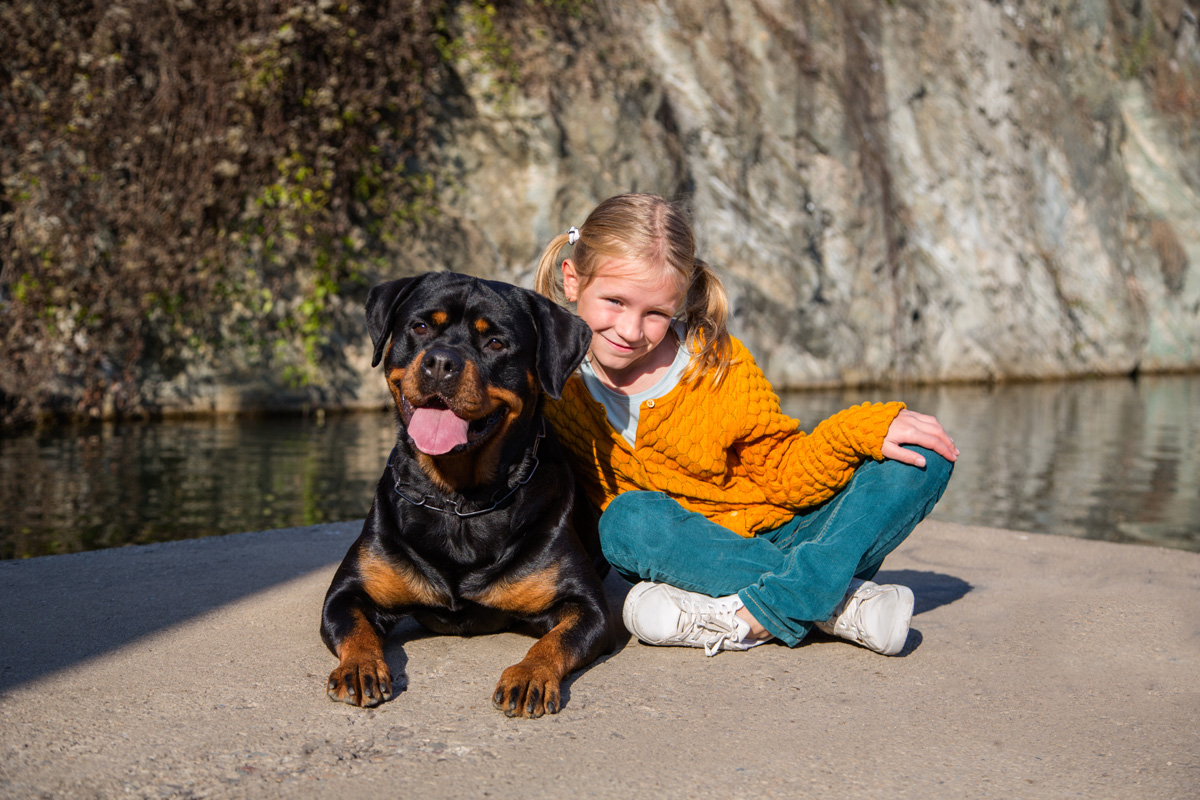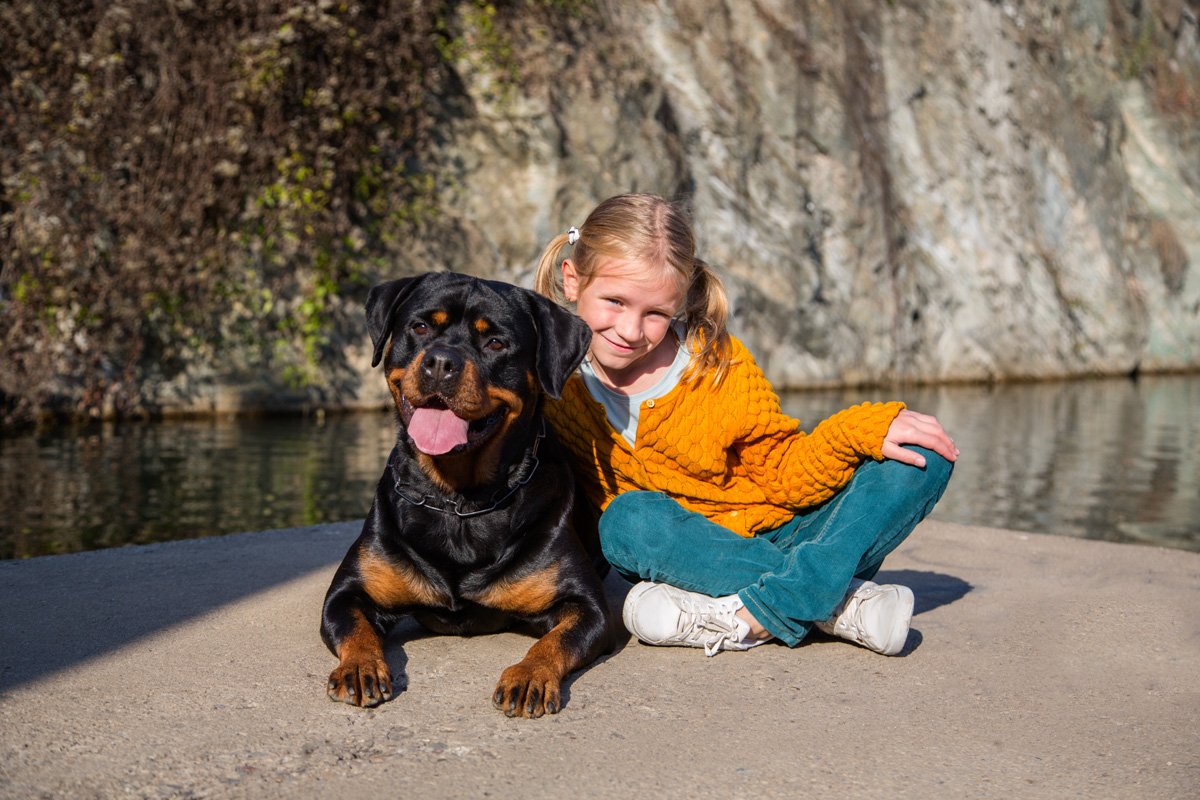Are Rottweilers naturally protective? If you’ve ever encountered a Rottweiler, you’ve probably noticed their impressive size and powerful presence. These dogs, with their muscular build and distinctive markings, have gained a reputation for being protective companions. But is this protective nature inherent in their breed? Let’s find out!
Rottweilers have a long history of working alongside humans, performing tasks like herding livestock and pulling carts. This working background has instilled in them a strong sense of loyalty and protectiveness. They have a natural instinct to protect their family, making them excellent guard dogs.
However, like any breed, individual Rottweilers may vary in their protective tendencies. Proper socialization, training, and positive reinforcement play crucial roles in shaping a Rottweiler’s behavior. So, while Rottweilers are known for their protective instincts, it’s essential to provide them with the right guidance to ensure they become well-rounded and balanced companions.
In summary, Rottweilers have a predisposition towards being protective due to their historical duties and innate loyalty. With the right training and socialization, they can grow into trustworthy and protective family members. So, if you’re considering a Rottweiler as your furry friend, rest assured that their protective nature is an intrinsic part of their breed.

Are Rottweilers Naturally Protective?
Rottweilers are a breed of dog known for their strength, intelligence, and loyalty. One of the most common questions people have about Rottweilers is whether or not they are naturally protective. In this article, we will explore the inherent protective nature of Rottweilers, their temperament, and how it can be influenced by various factors.
1. The Instinctual Nature of Rottweilers
Rottweilers have a natural instinct to protect their loved ones and territory. This protective instinct developed over centuries as they were originally bred as working dogs for tasks such as herding livestock, pulling carts, and guarding properties. Their natural protective nature can be traced back to their ancestry, where they were entrusted with vital roles that required them to be alert and assertive.
When properly trained and socialized, Rottweilers can channel their innate protective instincts in a positive and controlled manner, making them excellent family pets and loyal guardians. It is important to note that individual temperament may vary, but the breed as a whole tends to possess this protective instinct.
However, it is crucial to understand that the protective nature of Rottweilers does not equate to aggression. Proper training and socialization from an early age are essential to ensure that they develop into well-rounded, confident, and friendly dogs.
2. Factors Influencing Protective Behavior
Several factors can influence the extent to which a Rottweiler displays its protective instincts:
- Genetics: The genetics of a Rottweiler play a significant role in determining their temperament and level of protectiveness. Responsible breeders prioritize traits such as stability, trainability, and a balanced temperament when selecting breeding pairs to maintain the breed’s inherent protective instincts.
- Training: Proper training is crucial in shaping a Rottweiler’s behavior. Early socialization and obedience training help them understand appropriate responses to various situations and people. Consistent and positive reinforcement methods are highly effective in promoting good behavior and preventing aggression.
- Environment: The environment in which a Rottweiler is raised can influence their protective behavior. A loving and stable home, regular exercise, mental stimulation, and exposure to various people and situations can help them develop into confident and well-adjusted dogs. Conversely, a lack of proper socialization or negative experiences can lead to fearful or overly aggressive behavior.
3. Responsible Ownership and Safety
While Rottweilers have a natural protective instinct, responsible ownership is critical in ensuring their behavior is safe and manageable:
- Early Training and Socialization: Start training and socializing your Rottweiler from a young age to help them become well-rounded and obedient pets. Expose them to different environments, people, animals, and experiences to build their confidence and minimize potential aggression.
- Positive Reinforcement: Use positive reinforcement techniques, such as rewards and praise, to encourage good behavior and discourage aggressive tendencies. Harsh punishments or negative reinforcement can lead to fear-based responses and worsen their protective instincts.
- Secure Environment: Provide a secure and well-fenced environment where your Rottweiler can safely roam without feeling the need to protect their territory excessively. This will help them develop a balanced and confident approach to their surroundings.
- Regular Exercise: Rottweilers are an energetic breed that requires regular exercise to keep them mentally and physically stimulated. Sufficient exercise can help reduce anxiety and prevent boredom-related behavior issues.
- Professional Guidance: If you are unsure how to best handle your Rottweiler’s protective instincts or need assistance with training, consider seeking the help of a professional dog trainer or behaviorist who specializes in working with large, protective breeds.
Beyond Protection: Rottweilers as Loving Companions
While Rottweilers are naturally protective, it is essential to remember that they are more than just guard dogs. They have the potential to be loving, loyal, and affectionate companions. When raised in a nurturing environment and given proper training and socialization, Rottweilers can form strong bonds with their families and thrive as beloved family members.
Common Myths and Misconceptions
As with any breed, there are several myths and misconceptions surrounding Rottweilers and their protective nature. Let’s debunk some of the most common ones:
1. Rottweilers are inherently aggressive.
This is not true. While Rottweilers are protective, they are not innately aggressive. Aggression in Rottweilers is often a result of poor breeding, lack of socialization, mistreatment, or inadequate training. With responsible ownership and proper training, Rottweilers can be gentle and friendly companions.
2. Rottweilers cannot be trusted around children.
Like any dog breed, Rottweilers can be good with children when raised in a loving and well-socialized environment. However, it is important to always supervise interactions between dogs and children to prevent accidents and ensure mutual respect. Teaching children how to properly interact with dogs is vital for their safety and the dog’s well-being.
3. Rottweilers are high-maintenance dogs.
While Rottweilers do require consistent training, exercise, and socialization, they are not overly high-maintenance. With the right care and attention, they can adapt well to various lifestyles. Regular grooming, exercise, and mental stimulation are key to maintaining their physical and mental well-being. They also benefit from participating in activities that engage their intelligence and physical capabilities, such as obedience training, agility, or advanced problem-solving games.
4. Rottweilers have a locking jaw.
This is a common myth associated with several breeds, including Rottweilers. The notion of a “locking jaw” is a complete myth. Like any other breed of dog, Rottweilers have a normal jaw structure.
Conclusion
In conclusion, Rottweilers are a naturally protective breed with the potential to make loving and loyal companions. Their protective instincts can be harnessed with the right training, socialization, and responsible ownership. By providing them with a secure and loving environment, early training, and regular exercise, Rottweilers can thrive as well-rounded members of the family. Remember, responsible ownership and proper training are essential to ensuring a happy and safe relationship with your Rottweiler.
Key Takeaways: Are Rottweilers Naturally Protective?
- Rottweilers have a natural instinct to protect their family and territory.
- Training and socialization play a crucial role in determining a Rottweiler’s protective behavior.
- Rottweilers can be loving and gentle with proper training and socialization.
- Early socialization is important to ensure a well-rounded and balanced Rottweiler.
- While Rottweilers can be naturally protective, individual temperament may vary.
Frequently Asked Questions
Welcome to our FAQ section where we answer some common questions about the natural protective instincts of Rottweilers. Rottweilers are known for their loyalty and protective nature, but let’s dive deeper into this topic to understand if their protective behavior is inherent or learned.
1. Are Rottweilers naturally protective?
Yes, Rottweilers have a natural instinct to protect their family and territory. This breed was originally bred to guard livestock and protect their owners. Their protective nature is ingrained in their genetic makeup, and they are known for their strong guarding instincts. However, it’s important to note that each Rottweiler is an individual with their own personality and temperament.
While most Rottweilers naturally possess protective traits, the extent of their protective behavior can also be influenced by factors such as early socialization, training, and environment. Proper training and socialization are crucial to channel their protective instincts in a balanced and controlled manner.
2. At what age do Rottweilers start showing protective behavior?
Rottweilers may start exhibiting protective behavior as early as 6 to 8 weeks of age. During this stage, they begin to develop attachments to their family and surroundings. As they grow older, their protective instincts become more pronounced. However, it is important to remember that this timeline might vary from dog to dog since each Rottweiler is an individual.
Early socialization and proper training play a crucial role in shaping their protective behavior. Introducing them to different people, situations, and environments at a young age helps them become well-rounded individuals who can discern between genuine threats and normal everyday situations.
3. Can you train a Rottweiler to be more protective?
While Rottweilers have an innate protective instinct, their level of protectiveness can be influenced by training. Proper training can help channel their protective nature in a controlled manner and teach them how to respond appropriately to different situations.
However, it is important to strike a balance. Overly aggressive or protective behavior can become problematic, especially when the dog is unable to differentiate between real threats and harmless situations. Working with a professional dog trainer who specializes in positive reinforcement methods can help you shape your Rottweiler’s protective behavior in a safe and controlled manner.
4. Can a Rottweiler be protective without being aggressive?
Yes, a Rottweiler can exhibit protective behavior without being aggressive. Properly trained and socialized Rottweilers can understand the difference between a real threat and a normal situation. They can be protective by alerting their owners and showing a confident presence without resorting to aggression.
Early socialization is key to ensuring your Rottweiler develops proper behavior. By exposing them to various stimuli in a positive manner, you can help them become well-adjusted dogs that are naturally protective without being unnecessarily aggressive towards people or animals.
5. How can I encourage my Rottweiler to exhibit protective behavior?
The best way to encourage your Rottweiler to exhibit protective behavior is through appropriate training and socialization. Start by introducing them to various people, animals, and environments from an early age. This helps them develop confidence and a sense of security.
Consistent training, using positive reinforcement techniques, can help shape their protective behavior in a controlled manner. Engaging in activities like obedience training and giving them a job or specific tasks can also tap into their natural instincts and encourage them to showcase their protective nature.
ARE ROTTWEILER GOOD GUARD DOGS?
Summary
Rottweilers are naturally protective dogs, thanks to their instincts to guard and protect their family. However, training and socialization play a crucial role in shaping their behavior.
While Rottweilers have a natural inclination to be protective, it is important for owners to provide them with proper training and socialization from an early age. This helps them understand what is acceptable behavior and how to respond in different situations. By doing this, Rottweilers can become loyal, friendly, and well-behaved companions for their families.

)